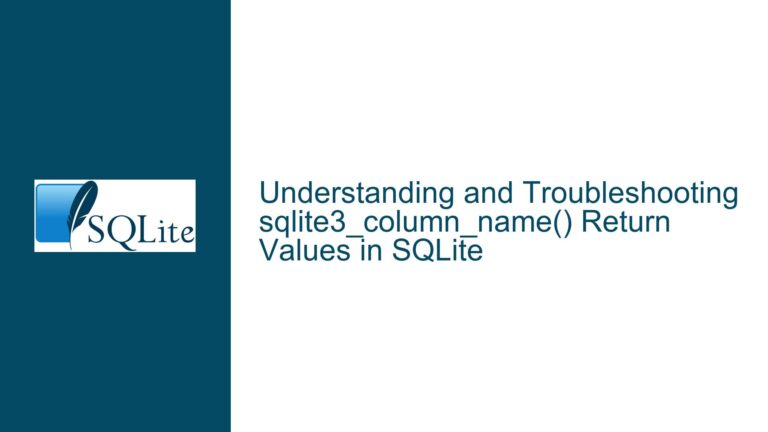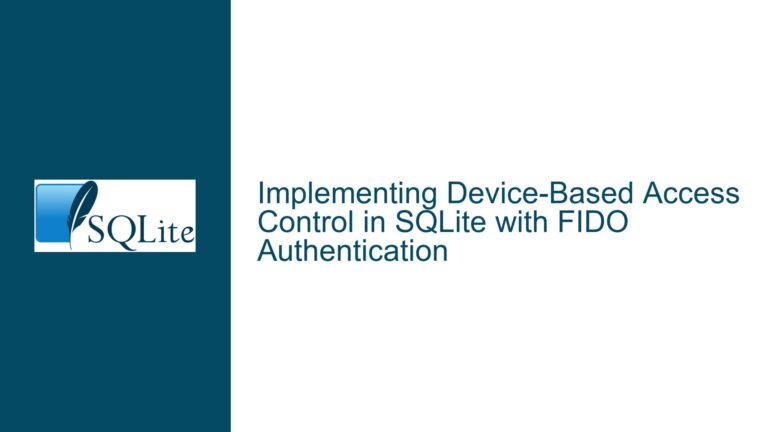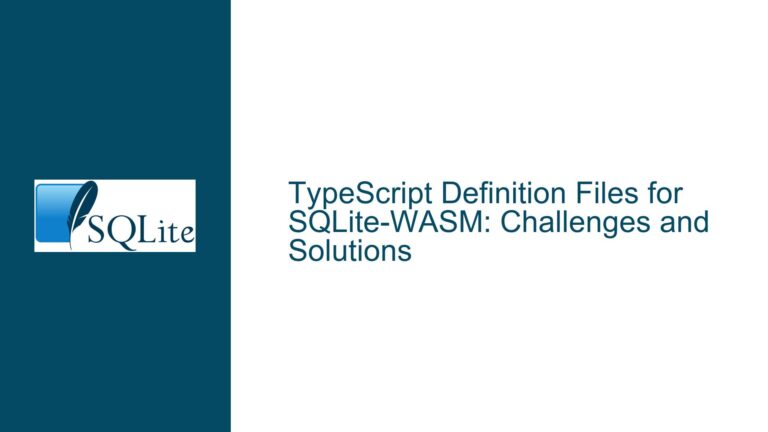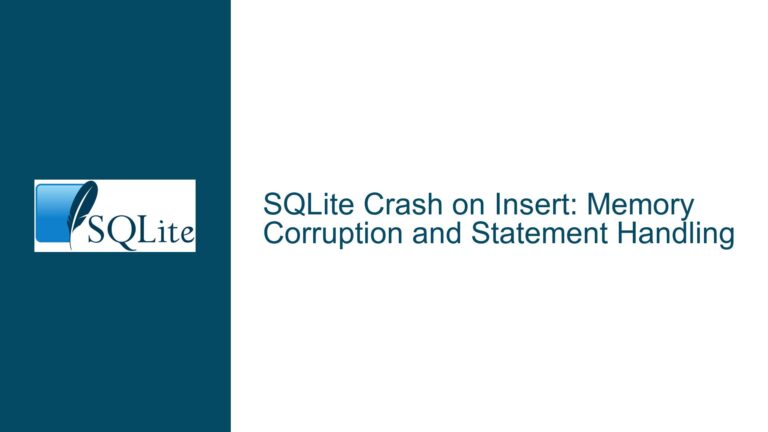Resolving SQLite CLI .import Issues with Non-Standard Separators (e.g., x’01’ SOH Character)
Understanding Column Separation Challenges in SQLite CLI Data Import
The process of importing structured text data into SQLite databases using the command-line interface (CLI) relies heavily on correctly configuring column separators. When the source data uses non-standard separators—such as ASCII control characters like x'01' (Start of Heading/SOH)—users often encounter unexpected behavior, including misaligned columns, incomplete imports, or outright failures. This guide dissects the technical nuances of configuring separators for the .import command, explores why conventional approaches fail with non-printable characters, and provides actionable solutions for robust data ingestion.
Core Obstacles in Specifying Non-Printable Separators for CLI-Based Imports
Ambiguity in Separator Representation Across Environments
The primary challenge arises from the disconnect between how separators are represented in source files, interpreted by the SQLite CLI, and rendered in different operating systems. The ASCII x'01' character (SOH) exemplifies this problem: it is a non-printable control character that lacks a universal keyboard input method. Users might attempt to represent it as \x01, ^A (caret notation), or Ctrl+A, but these representations are environment-dependent. For instance, caret notation (^A) is recognized in Unix-like shells but not natively in Windows Command Prompt.
CLI’s .separator Command Limitations
The .separator command in SQLite CLI accepts either a single character or a two-character string. When using escape sequences like \01, the CLI internally converts this to the corresponding ASCII character. However, inconsistencies emerge when the separator overlaps with reserved characters in the shell or when escape sequences are improperly formatted. A common mistake is using \x01 (hexadecimal notation) instead of \01 (octal), which the CLI does not support.
File Encoding and Line Termination Conflicts
Text files containing non-printable separators often originate from legacy systems or specialized applications that use fixed-width formats or binary-like delimiters. If such files include inconsistent line endings (e.g., mixing CRLF and LF), the .import command may misinterpret row boundaries, causing partial reads or merged rows. Additionally, UTF-8 encoding with BOM (Byte Order Mark) headers can introduce hidden characters that interfere with separator detection.
Diagnosing and Resolving Separator Configuration Errors
Validating Separator Hexadecimal Representation
Before attempting the import, confirm the actual hexadecimal value of the separator using a hex editor or diagnostic tools like xxd (Unix) or CertUtil (Windows). For example, a file containing ajayx'01'100.78 should display 61 6A 61 79 01 31 30 30 2E 37 38 in hex. Misidentification of the separator (e.g., confusing x'01' with x'00' or x'1C') is a frequent root cause of failed imports.
Configuring .separator with Octal Escape Sequences
In the SQLite CLI, non-printable separators must be specified using octal escape sequences:
.separator "\01"
This command sets the separator to x'01'. Note that:
- The escape sequence must be enclosed in double quotes.
- Leading zeros are optional (
\01≡\1), but explicit two-digit notation improves readability. - Hexadecimal escapes (e.g.,
\x01) are not supported and will be treated as literal strings.
Shell-Specific Input Methods for Non-Printable Characters
In Unix-like shells (Bash, Zsh), type Ctrl+V followed by Ctrl+A to insert x'01' directly into the command. The terminal will display ^A, but the CLI receives the actual SOH character. Verify this by running:
.separator "^A"
In Windows PowerShell or Command Prompt, direct input of control characters is less straightforward. Use PowerShell’s escape syntax:
sqlite3.exe "test.db" ".separator `"`u{1}`"" ".import data.txt my_table"
Handling Multi-Character or Regex-Based Separators
For complex separators (e.g., multi-character sequences or regex patterns), preprocess the file using sed (Unix) or PowerShell to replace x'01' with a temporary delimiter like |:
sed -e 's/\x01/|/g' source.txt > processed.txt
Then import using .separator "|". This workaround is essential when dealing with CLI limitations, though it introduces additional steps.
Addressing Encoding and Line Ending Inconsistencies
Convert the file to UTF-8 without BOM and standardize line endings to LF:
iconv -f ISO-8859-1 -t UTF-8//TRANSLIT source.txt | dos2unix > cleaned.txt
Use .import cleaned.txt my_table after setting the separator. For large files, stream-processing tools like awk can perform encoding conversion and delimiter replacement simultaneously.
Debugging Partial or Incorrect Data Imports
Enable the CLI’s diagnostic output by setting .mode quote and .headers on, then run SELECT * FROM my_table LIMIT 5;. Look for unseparated values or unexpected NULLs. If columns are merged, recheck the separator configuration; if data is truncated, inspect the file for hidden control characters using cat -vte (Unix) or Get-Content -Encoding Byte (PowerShell).
Advanced Techniques for Robust Data Ingestion
Leveraging Temporary Staging Tables
Create a staging table with a single TEXT column to import raw rows, then split columns using SUBSTR and INSTR:
CREATE TABLE staging(raw TEXT);
.import data.txt staging
CREATE TABLE final AS
SELECT
SUBSTR(raw, 1, INSTR(raw, char(0x01)) - 1) AS name,
SUBSTR(raw, INSTR(raw, char(0x01)) + 1) AS value
FROM staging;
This approach isolates parsing logic from the import process, allowing for iterative debugging.
Automating Imports with Shell Scripts
For recurring imports, encapsulate the workflow in a script:
#!/bin/bash
INPUT_FILE="$1"
TABLE_NAME="$2"
TEMP_FILE="$(mktemp)"
# Replace x'01' with pipe and convert line endings
sed -e 's/\x01/|/g' -e 's/\r$//' "$INPUT_FILE" > "$TEMP_FILE"
sqlite3 my_db.db <<EOF
.separator "|"
.import "$TEMP_FILE" "$TABLE_NAME"
EOF
rm "$TEMP_FILE"
Utilizing SQLite’s Virtual Tables for On-Demand Parsing
For files requiring dynamic parsing, create a virtual table using the csv module (SQLite 3.22+):
.load /usr/lib/sqlite3/extensions/csv.so
CREATE VIRTUAL TABLE temp.parsed_data USING csv(
data='data.txt',
delimiter=char(0x01),
header=TRUE
);
This method bypasses the .import command entirely, offering finer control over delimiters and data types.
By methodically addressing separator representation ambiguities, leveraging environment-specific input methods, and employing preprocessing or advanced SQL techniques, users can reliably import text files with non-standard delimiters into SQLite. The key lies in rigorously validating the separator’s actual byte value, respecting the CLI’s escape sequence rules, and isolating parsing logic from data ingestion where practical.






